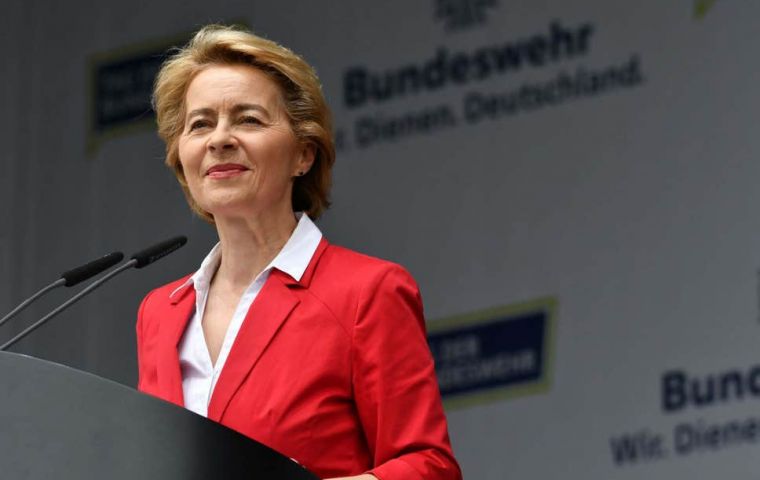MercoPress. South Atlantic News Agency
EU leaders reach a precarious agreement on EC's top jobs which need parliament confirmation
 German Defense Minister Ursula von der Leyen, France's Christine Lagarde and Belgium's Charles Michel were nominated to become the new members of the European Commission
German Defense Minister Ursula von der Leyen, France's Christine Lagarde and Belgium's Charles Michel were nominated to become the new members of the European Commission  France's Christine Lagarde was proposed for the presidency of the European Central Bank
France's Christine Lagarde was proposed for the presidency of the European Central Bank  Belgium's Charles Michel for European Council president, and Spain's Josep Borrell for EU foreign policy chief.
Belgium's Charles Michel for European Council president, and Spain's Josep Borrell for EU foreign policy chief. European Union leaders have agreed on Tuesday on who should fill the top jobs for its main institutions for the next five years after a marathon summit marred by disagreement.
German Defense Minister Ursula von der Leyen was nominated to become the new president of the bloc's powerful executive arm, the European Commission, one of two women named to top EU posts for the first time.
France's Christine Lagarde was proposed for the presidency of the European Central Bank, Belgium's Charles Michel for European Council president, and Spain's Josep Borrell for EU foreign policy chief.
“The European Council has agreed on the future leadership of the EU institutions,” current European Council President Donald Tusk said.
Lagarde has been the managing director of the International Monetary Fund (IMF) since 2011, while Michel became Belgium's youngest prime minister in 2014.
Commenting on the announcement of two women as nominees for the top EU positions, Tusk told reporters at a press conference following the talks: “I am really happy about it. After all, Europe is a woman.”
Europe takes its name from Europa, a female consort of the god Zeus in Greek mythology.
Von der Leyen, who was Germany's defense minister for six years was described as a very experienced politician. The contentious point - apart from the fact that she has expressed federalist sentiments in public, which is a no-no for some people in Brussels, and a good thing for others - is that she is from the centre-right, the European People's Party, she's a member of Chancellor Merkel's CDU in Germany.
Although the nominations finally came through, Tusk clarified it was still “not a done deal”. The nominee choices still need to be debated and ratified by the European Parliament. European leaders suspended their summit on Monday following 20 hours of talks failed to produce a deal on the EU's top jobs.
The inability to find consensus candidates during marathon negotiations that ran through the night reflected the fragmented state of the bloc's parliament and underlined the problems in reaching a common position on issues from migration to climate change that have grown as the European Union has expanded.
One of the main obstacles was the strong objection by Eastern European countries to a deal hatched by France, Germany and Spain to hand the European Commission presidency to Dutch socialist Frans Timmermans.
Timmermans's nomination was also deeply unpopular with the centre-right European People's Party (EPP) group in the European Parliament, which argued it should hold the commission presidency as it has the most legislators in parliament.
“The prospect of Frans Timmermans getting the presidency of the European Commission did worry a lot of Eastern European states like Poland and Hungry”
“We are hearing from Donald Tusk that for the European parliament's presidency, for the first two and a half years of the next term, the job would go to a member of the socialists and democrats. And for the second half, it would be somebody from the EPP.”




Top Comments
Disclaimer & comment rulesCommenting for this story is now closed.
If you have a Facebook account, become a fan and comment on our Facebook Page!